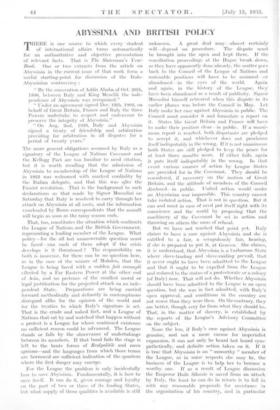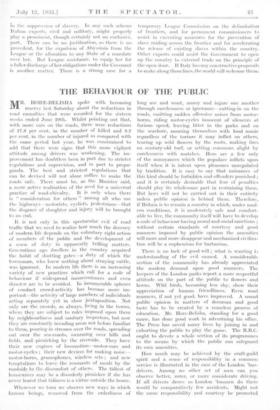ABYSSINIA AND BRITISH POLICY
THERE is one source to which every student of international affairs turns automatically for an authoritative and objective presentation of relevant facts. That is The Statesman's Year- Rook. One or two extracts from the article on Abyssinia in the current issue of that work form a useful starting-point for discussion of the Italo- Abyssinian controversy : " By the convention of Addis Ababa of Oct. 26th, 1896, between Italy and King Menelik the inde- pendence of Abyssinia was recognized." " Under an agreement signed Dee. 13th, 1906, on behalf of Great Britain, France and Italy the three Powers undertake to respect and endeavour to preserve the integrity of Abyssinia." " On Aug. 2nd, 1928, Italy and Abyssinia signed a treaty of friendship and arbitration providing for arbitration in all disputes for a period of twenty years."
The more general obligations assumed by Italy as a signatory of the League of Nations Covenant and the Kellogg Pact are too familiar to need citation; but it is worth recalling that the admission of Abyssinia to membership of the League of Nations in 1923 was welcomed with marked cordiality by the Italian delegate, and that this was after the Fascist revolution. That is the background to such declarations as • that made by Signor Mussolini on Saturday that Italy is resolved to carry through her attack on Abyssinia at all costs, and the information vouchsafed by Rome correspondents that the assault will begin as soon as the rainy season ends.
That, too, constitutes the situation which confronts the League of Nations and the British Government, representing a leading member of the. League. What policy—for the all but unanswerable question must be faced—can each of them adopt if the crisis develops is it threatened ? The responsibility on both is immense, for there can be no question here, as in the case of the seizure of Mukden, that the League is being faced with a sudden fait accompli effected by a Far Eastern Power at the other end of Asia, and no pretence of the smallest moral or legal justification for the projected attack on an inde- pendent State. Preparations are being carried forward methodically and defiantly in contemptuous disregard alike for the opinion of the world and for the treaties to which Italy's signature is set. That is the crude and naked fact, and a League of Nations that sat by and watched that happen without a protest is a League for whose continued existence no sufficient reason could be .advanced. The League stands or falls by the observance of undertakings between its members. If that bond fails the stage is left to the brute forces of Realpolitik and sacra egoismo—and the languages from which those terms are borrowed are sufficient indication of the quarters where the first danger may emerge.
For the League the problem is only incidentally how to save Abyssinia. Fundamentally, it is how to save itself. It can do it, given courage and loyalty on the part of two or three of its leading „States, but what supply of those qualities is available is still unknown. A great deal may—almost certainly will—depend on procedure. The dispute must be brought into the open and . kept there. If the conciliation proceedings at the Hague break down, as they have apparently done already, the matter goes back to the Council of the League of NatiOns and untenable positions will have to be assumed--or abandoned—in the eyes of the world. Again and, again, in the history of the League, they have been abandoned as a result of publicity. Signor Mussolini himself retreated when this dispute in its earlier phases was before the Council in May. Let Italy make her case against Abyssinia in public. The Council must consider it and formulate a report on it. States like Great Britain and France will have to make their position clear—in public. If a unani- mous report is reached, both disputants are pledged to accept it, and whichever does not proclaims itself indisputably in the wrong. If it is not unanimous both States are still pledged to keep the peace for at least three months more. If either fails, again it puts itself indisputably in the wrong. In that event various courses of action by League States are provided for in the Covenant. They should be considered, if necessary on the motion of Great Britain, and the attitude of members of the Council disclosed—in public. United action would .make an Abyssinian war impossible. This country cannot take isolated action. That is not in question. But it can and must in case of need put itself right with its conscience and the world by proposing that. the machinery of the Covenant be set in action and throwing on others the onus of refusal.
But we have not reached that point yet. Italy claims to have a case against Abyssinia and she is entitled to a fair, a scrupulOusly fair, hearing, if she is prepared to put it, at Geneva. She claims, it is understood, that Abyssinia is a barbarous State where slave-trading and slave-raiding prevail, that it never ought to have been admitted to the League and that it ought to be expelled from the League and reduced to the status of a protectorate or a colony (of Italy) now. That will not do. Whether Abyssinia should have been admitted to the 'League is an open question, but she was in fact admitted, with Italy's open approval, arid conditions in the country are not worse than they were then. On the contrary, they are better, though very far from what they should be. That, in the matter of slavery, is established' by the reports of the League's Advisory CoMinitted on the subject.
None the less, if Italy's case against Abyssinia is genuine, and not a mere excuse for imperialist expansion; it can not only be heard but heard sym- pathetically, • and definite action taken on it. If it
44
is true that Abyssinia is an unworthy " member of the League, as in Aorde respects she may be, the business of the League is' to help her to beCOme worthy one. If as a result of League discussion the Emperor Haile Silassie is saved from an attack by Italy, the least he can do in return is to fall in with any reasonable proposals for assistance in the organization of his country, and in particular.
in the suppression of slavery. In any such scheme Italian experts, civil and military, might properly play a prominent, though certainly not an exCluSiVe, part., . There can be no justification, as there is no precedent, for the expulsion of Abyssinia from the League or the allocation to any State of a mandate over her. But League assistance, to equip her for a fuller, discharge of her obligations under the Covenant is another matter. There is a strong case for a temporary League Commission on the delimitation of • frontiers, and for permanent commissioners to assist in executing measures for the prevention of slave raiding across the frontier and for accelerating the release of existing slaves within the country. Other experts could assist the Government to open up the country, to external trade on the principle of the open door. If Italy has any constructive proposals to make along those lines, the world will welcome them.











































 Previous page
Previous page